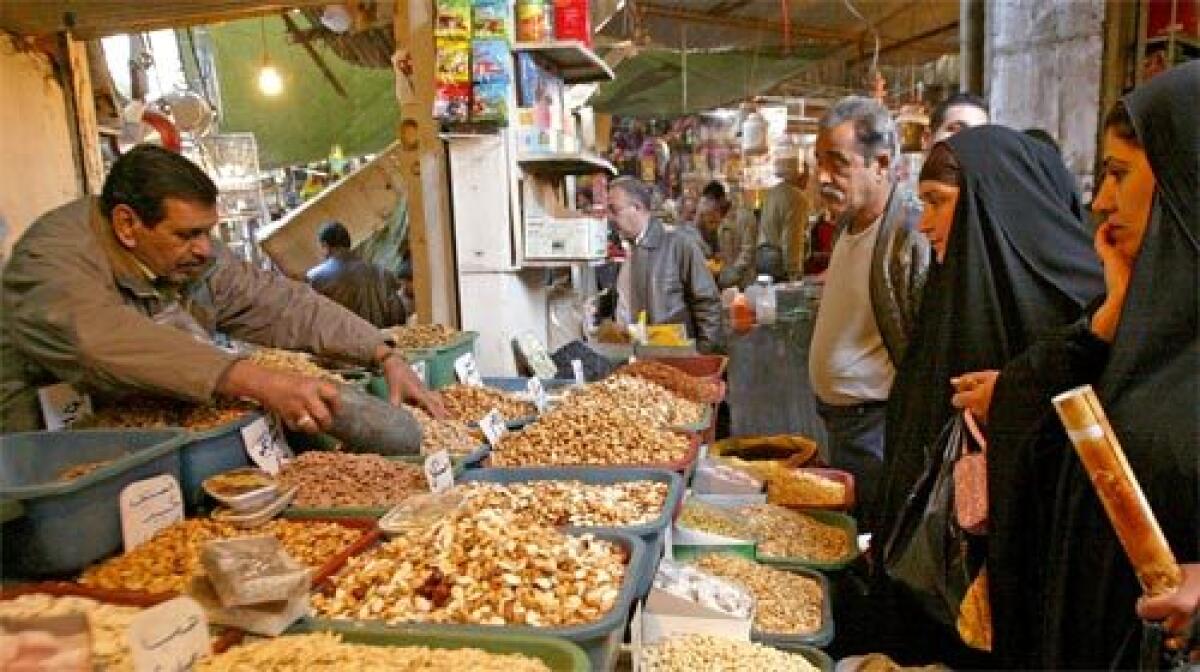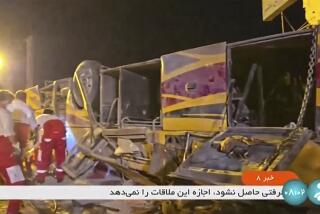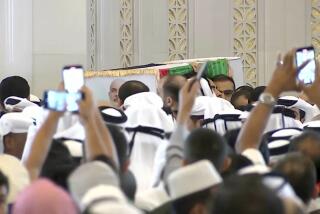Iraq’s Sunnis celebrate holiday with a renewed vigor

Thousands of Sunni Muslim faithful bowed their heads at dawn Wednesday in mosques around Baghdad for the first prayers of the Eid al-Adha holiday -- a time of renewed hope after months of reduced bloodshed, yet tinged with sadness for those not there to share it.
It was the largest turnout in years at Abu Hanifa, Baghdad’s largest Sunni mosque, where worshipers spilled into the yard and the streets outside. After the service, long lines formed to buy slices of pastry eaten with syrup and cream, a traditional holiday breakfast.
Relatives long separated by the killing that raged in Baghdad’s bloodied streets were reunited again.
“I visited family and friends all over Baghdad,” marveled Sabah Abdul-Wahab, a young chef, who spent last year’s four-day holiday confined with his parents and siblings in the upmarket Karada district. “I also went to Zawra Park, and the place was filled with families having picnics and just relishing the newfound security.”
Later, goats, sheep and cows were slaughtered for family feasts commemorating the prophet Abraham’s willingness to sacrifice his son for God. One proud man was spotted posing for a snapshot with his arm around the neck of a cow before dispensing with the beast.
U.S. commanders say violence across Iraq is at its lowest level since the first year after the 2003 American-led invasion. They credit the deployment of additional U.S. troops, a freeze in activities by a powerful Shiite Muslim militia and the decision of thousands of Sunni Arab tribesmen to resist the insurgents they once backed.
But officials in Baghdad on Wednesday were leaving nothing to chance. Extra security was deployed with bomb-detecting equipment around mosques, parks, markets and other places where people gather for the holiday.
Though an unusually quiet day, there were reminders that militants remain active. A bomb targeting a police patrol in east Baghdad killed one policeman and injured three others, authorities said. And the body of a slain person was found in Baghdad.
But the relative calm pervading the capital was a stark contrast to the holiday’s start last year, when at least 78 people were killed in explosions across Iraq and sixteen corpses were recovered in Baghdad alone, victims of execution-style slayings. On that day, people woke up to hear the news that Saddam Hussein had been hanged, spreading bitterness, fear and anger among his fellow Sunnis, even as Shiites fired guns into the air to celebrate the tyrant’s demise.
Those days seemed a dark, unpleasant memory as members of Naif Talal’s extended family gathered at his grandfather’s home in the Adil neighborhood, scene of some of the worst fighting of Baghdad’s sectarian war. Everyone brought a dish: sizzling kebabs, an eggplant casserole, carrot pilaf and savory stews.
“I remember last year, all we would talk about is how so and so was killed or involved in a terrorist incident,” said Talal, a technical surveyor with a young wife and 18-month-old daughter.
This year, the conversation was all politics: U.S. Secretary of State Condoleezza Rice’s visit to Iraq on Tuesday and the United States’ difficulties in the Middle East.
Life is slowly picking up in Adil, where families venture out later at night and markets stay open past sunset. But by 7 p.m., most people are home, Talal said. In previous years, he would have driven out of town for a picnic and visited the family graves. But the cemetery is in Baghdad’s western Abu Ghraib neighborhood, which remains volatile.
“The main setback, though, is that many of our friends and loved ones have moved abroad,” he said. “Everybody has been dispersed, so we miss them and wish that we were able to spend some time with them on this occasion.”
In Amiriya, a former Baghdad insurgent stronghold, children raced through the streets setting off firecrackers and men filled a local mosque -- except for Anas.
“I don’t like the way the preacher speaks,” said the man, who did not want his full name published in case of retribution. “When Al Qaeda were in control, he used to preach for jihad [holy war]. Before that, he used to pray for Saddam. And now there are the Americans. He goes with the times.”
The ebb in violence has been a boon to shopkeepers and market vendors, as Iraqis turn out in large numbers to buy candy, nuts and clothes for the holiday.
“More people are buying and shopping, and we have made big profits,” said Mohammed Faruq, who runs a market stall in the oil-rich northern city of Kirkuk, where Rice made a stop Tuesday.
But many people are struggling to cope with the ever increasing prices.
“Shirts and pants now cost more than 40,000 Iraqi dinars, which is about $35,” said Ahmed Ubaidi, who was forced to buy secondhand for his wife and children this year. “This is a steep price for us government employees with salaries not exceeding [about $200 per month].”
In a reminder of the persistent differences between the two Muslim sects, Shiites will begin celebrating Eid al-Adha on Friday. For Sunnis living in Shiite areas, that meant subdued gatherings that would not attract the attention of their neighbors.
“Last year’s Eid was a very mournful event because of Saddam’s execution,” said Udai Ali, a Sunni resident in overwhelmingly Shiite Basra, Iraq’s second-largest city. “I’m not defending him, but Eid is supposed to be an occasion for happiness, and it is considered a holy event. . . . No one should be executed on this day, regardless of their crime.”
This year is better, he said. “The only thing that saddens me is that Muslims are not united in celebrating this day. It would have been better and more beautiful if the case was the opposite.”
Some Shiites, however, made a point of visiting Sunni friends in Basra, where British forces last weekend handed full responsibility for security to Iraqi authorities.
“The recent transfer of security authority is also an Eid [celebration] for us,” said Aqeel Musawi, a Shiite taxi driver, who was making the rounds in the predominantly Sunni suburb of Zubair.
There was greater unease north of Baghdad, where much of the current fighting is taking place. The U.S. command says insurgents pushed out by the troop buildup in Baghdad and a tribal rebellion in Anbar province are establishing new hide-outs in parts of Diyala, Salahuddin and Nineveh provinces.
For Alya Ali, a college student in the Nineveh provincial capital, Mosul, the holiday meant another day shut up at home by parents fearful for her safety.
“I find Eid days are depressing,” she said. “For me and other Mosul girls, holidays and staying at home means cleaning and hard housework.”
Times staff writer Wail Alhafith in Baghdad and special correspondent Ruaa al-Zarary in Mosul contributed to this report along with special correspondents in Baghdad and Kirkuk.
More to Read
Sign up for Essential California
The most important California stories and recommendations in your inbox every morning.
You may occasionally receive promotional content from the Los Angeles Times.










